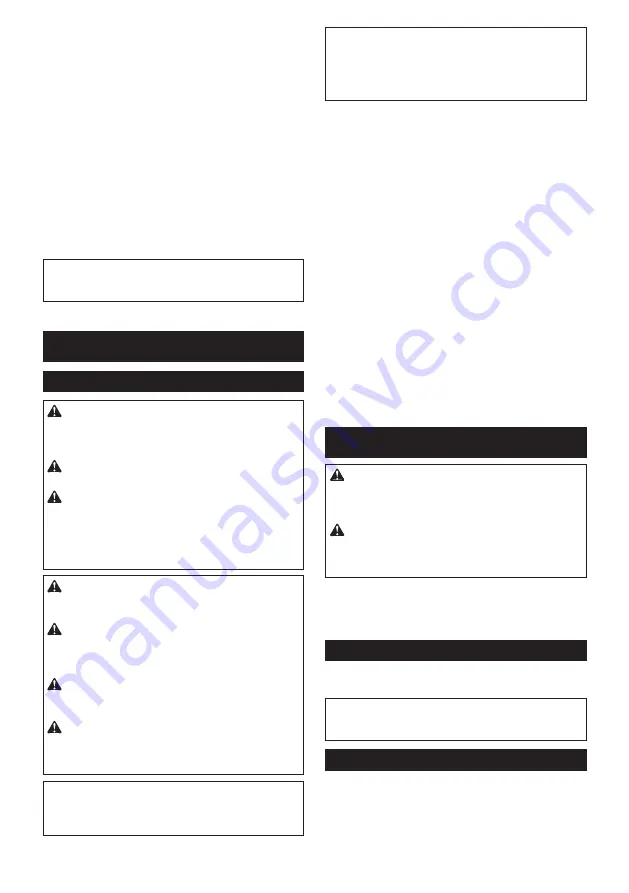
13 ENGLISH
The chip receiver gathers discarded leaves and makes
clean-up afterward much easier. It can be installed on
either side of the tool.
1.
Align the holes on the chip receiver with the nuts
on the shear blades.
►
Fig.16:
1.
Nut
2.
Hook the claws of the chip receiver to the groove
on the shear blades.
►
Fig.17:
1.
Claw
2.
Groove
3.
Press the levers on the chip receiver, and then
hook the claws on the other side to the groove on the
shear blades.
►
Fig.18:
1.
Lever
To remove the chip receiver, press the levers to release
the claws.
►
Fig.19:
1.
Lever
NOTICE:
Never try to remove the chip receiver
by an excessive force with its claws locked in the
grooves of the shear blades.
OPERATION
Operating the tool
WARNING:
Do not use the tool near any
electrical power lines.
Contacting with power lines
or using the tool near power lines may cause serious
injury or electric shock resulting in death.
WARNING:
Keep hands away from shear
blades.
WARNING:
Be extremely careful to maintain
control of the tool at all times. Do not allow the
tool to be deflected toward you or anyone in the
work vicinity.
Failure to keep control of the tool
could result in serious injury to the bystander and the
operator.
CAUTION:
Avoid operating the tool in very
hot weather as much as practicable. When operat-
ing the tool, be careful of your physical condition.
CAUTION:
Be careful not to accidentally
contact a metal fence or other hard objects while
trimming.
The shear blades may break and cause
an injury.
CAUTION:
Be careful not to allow the shear
blades to contact the ground.
The tool may recoil
and cause an injury.
CAUTION:
Overreaching with a hedge trim-
mer, particularly from a ladder, is extremely
dangerous.
Do not work while standing on anything
wobbly or infirm.
NOTICE:
Do not attempt to cut branches thicker
than 10 mm in diameter with the tool.
Cut branches
to 10 cm lower than the cutting height using branch
cutters before using the tool.
►
Fig.20:
(1)
Cutting height
(2)
10 cm
NOTICE:
Do not cut down dead trees or similar
hard objects.
Doing so may damage the tool.
NOTICE:
Do not trim the grass or weeds while
using the shear blades.
The shear blades may
become tangled in the grass or weeds.
Hold the tool with both hands by holding the front grip
and the rear grip.
►
Fig.21:
1.
Front grip
2.
Rear grip
Pull the switch trigger while pressing the lock-off button,
and then move the tool forward.
►
Fig.22
For basic operation, tilt the shear blades toward the
trimming direction and move it calmly and slowly at the
speed rate of 3 to 4 seconds per meter.
►
Fig.23
To cut a hedge side evenly, cut from the bottom to top.
►
Fig.24
When trimming to make a round shape (trimming box-
wood or rhododendron, etc.), trim from the root to the
top for a beautiful finish.
►
Fig.25
If the chip receiver is attached to the shear blades, it
gathers discarded leaves and makes clean-up after-
ward much easier.
►
Fig.26
MAINTENANCE
CAUTION:
Always be sure that the tool is
switched off and the battery cartridge is removed
before attempting to perform inspection or
maintenance.
CAUTION:
When inspecting or maintaining
the tool, always put the tool down.
Assembling or
adjusting the tool in an upright position may result in
serious injury.
To maintain product SAFETY and RELIABILITY,
repairs, any other maintenance or adjustment should
be performed by Makita Authorized or Factory Service
Centers, always using Makita replacement parts.
Cleaning the tool
Clean the tool by wiping off dust with a dry cloth or one
dipped in soapy water and wrung out.
NOTICE:
Never use gasoline, benzine, thinner,
alcohol or the like. Discoloration, deformation or
cracks may result.
Shear blade maintenance
Before the operation or once per hour during operation,
apply low-viscosity oil (machine oil, or spray-type lubri
-
cating oil) to the shear blades.
►
Fig.27
Summary of Contents for UN460WDZX1
Page 2: ...1 3 5 6 7 8 10 9 4 2 Fig 1 1 2 3 Fig 2 1 2 Fig 3 1 2 Fig 4 1 2 Fig 5 1 Fig 6 1 2 Fig 7 2 ...
Page 3: ...1 Fig 8 1 Fig 9 1 2 Fig 10 1 2 3 4 Fig 11 1 2 Fig 12 1 Fig 13 1 Fig 14 3 ...
Page 4: ...1 Fig 15 1 Fig 16 1 2 Fig 17 1 Fig 18 1 Fig 19 1 2 Fig 20 1 2 Fig 21 15 m Fig 22 4 ...
Page 5: ...15 m Fig 23 15 m Fig 24 15 m Fig 25 15 m Fig 26 Fig 27 Fig 28 5 ...














































